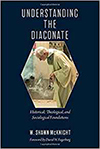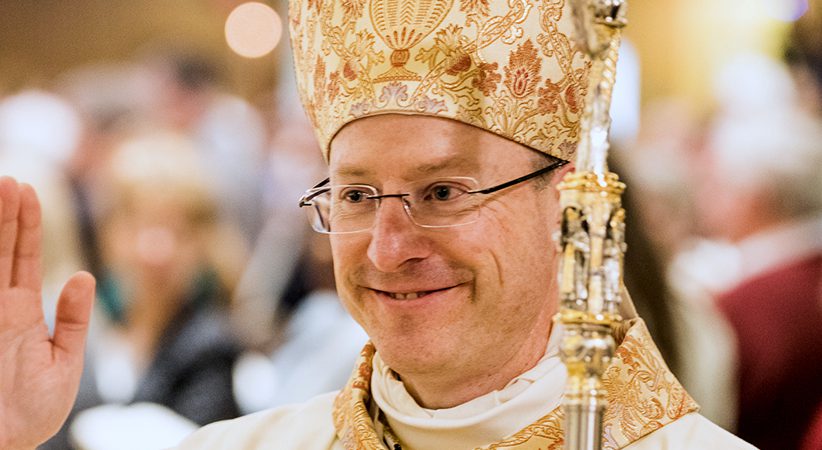A Call to Rethink the Diaconate
New book looks at the past, hopes for the future
Deacon Victor Puscas Comments Off on A Call to Rethink the Diaconate
The very idea of a deacon reviewing a book written by a bishop only proves the time-honored maxim that fools rush in where angels fear to tread. This particular fool chooses to begin with the words of the fictive restaurant critic Anton Ego from the Disney movie “Ratatouille”: “In many ways, the work of a critic is easy. We risk very little yet enjoy a position over those who offer up their work and their selves to our judgment.” Well, in my judgment, Bishop W. Shawn McKnight’s work, “Understanding the Diaconate: Historical, Theological, Sociological Foundations,” should be required reading for every Catholic because of the widespread misunderstanding — even among bishops and priests — about the proper role of a deacon.
…………………………………………………………………………………………………………………………………………………………….
From the Foreword
“One can find histories of the diaconate. One can find theologies of the diaconate.
One can find pastoral treatments of diaconal ministry. But one very rarely finds these all within the same covers, and one never finds them integrated by an insightful hermeneutic stemming from the social sciences. The combination of these four dimensions — history, theology, pastoral practice, and an approach that sees the deacon as social intermediary and symbol of communitas — makes this an extraordinary book that will advance the objectives of Vatican Council II when it called for the restoration of the permanent diaconate.”
— David Fagerberg, associate professor of theology at the University of Notre Dame
……………………………………………………………………………………………………………………………………………………………..
According to the Pontifical Yearbook and the Annuarium Statisticum Ecclesiae, the diaconate is the only vocation showing increases in numbers in the United States, yet the Church gives comparatively little creative thought to the formation, training and assignment of deacons. Bishop McKnight’s book is a concise historical, theological and scriptural explanation of the diaconate, but, more importantly, it is an example of what Franciscan Father Richard Rohr calls “creative leadership.” That is, good leaders have a capacity for thinking beyond polarities, beyond a binary either/or mentality to a reconciling third space. In other words, instead of focusing on what a deacon can or cannot do, Bishop McKnight, bishop of the Diocese of Jefferson City, Missouri, focuses on what a deacon should be. Deacons are not mini-priests, or super-laymen or glorified altar boys. Deacons are the Church’s service sacramentalized, and they are most effective in extraliturgical settings.
This book can be a bit scholarly, more appropriate for the academy than the coffee table. It is heavily footnoted and thoroughly researched. Still, it is not intimidating or pretentious, but, rather, is eminently readable. Bishop McKnight points out that the Church could be using its deacons more appropriately and effectively, but the Church lacks creativity. The deacon, he explains, is not ordained to the priesthood, but to the bishop’s ministry that has the community as its object. Instead of the bishop assigning deacons to a particular ministry, most deacons typically are assigned to their home parishes, where they are given liturgical functions that, while important, are not the primary ministry of a deacon. An unfortunate consequence of the dominance of parish-based diaconal ministry is confusion about the identity of the deacon.
| More Info |
|---|
 Title: Understanding the Diaconate:
Historical, Theological, Sociological
Foundations
Author: Bishop W. Shawn McKnight Publisher: The Catholic University of America Press Price: $29.95 To order: cuapress.org |
The primary functions of the deacon, Bishop McKnight would argue, are as a “social intermediary” between the bishop and his people, the bishop and the poor and, anthropologically, as a “symbol of communitas.” Unfortunately, the Church does not empower deacons; it tolerates them. For example, very little creative thought is given to assigning deacons to meaningful social-justice ministries. By contrast, Bishop McKnight envisions a Church where deacons are empowered to act independently from their parish, where they populate meaningful positions in the diocesan chancery, provide pastoral care to families, the imprisoned and the sick, and teach the Faith, especially to those who have fallen away from the Church.
Bishop McKnight envisions deaconries that would allow several parishes to share diaconal resources. Furthermore, deacons should be on pastoral councils, finance committees and parish administration staffs. The point is that the first key step to change is to understand the proper role of the diaconate — not only for deacons themselves, but for bishops, priests and the laity. Bishop McKnight finishes his book by adapting a line from Pope St. John Paul II: It is time for the Church to say, “Deacons, become what you are!”
DEACON VICTOR PUSCAS was ordained in 2011 as a bi-ritual deacon with faculties in both the Latin rite (Diocese of Joliet, Illinois) and the Eastern rite (Eparchy of St. George in Canton, Ohio).





